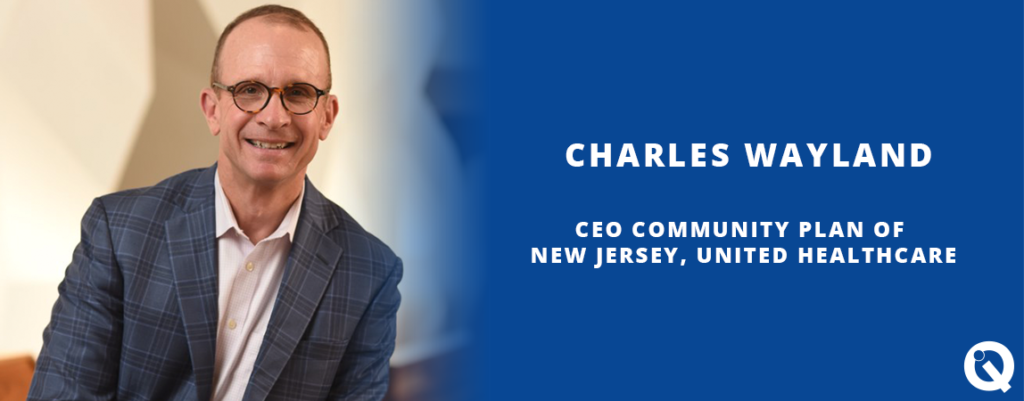Charles Wayland is the new CEO of the UnitedHealthcare Community Plan of New Jersey, a member of the Quality Institute’s Plan Council.
Can you tell us your priorities when you took this position — and have they changed?
When I started, our top priority was really about taking care of our members in New Jersey. In the Medicaid population, each member is distinctive. It’s a population of one, which is very different from your commercial insurance products. It’s an entire ecosystem to take care of these members. A priority is getting connected and building relationships with the people in that ecosystem … with the providers, the advocates, the FQHCs, and the elected officials who create health care policy in New Jersey. You build relationships to be part of the ecosystem that supports these members. And that really hasn’t changed. The way we network and connect has changed because a lot is done virtually and on phone calls now. So the mode of how we connect has changed, but our objective and priorities have not changed.
With COVID-19, what steps is the plan taking to make sure that members are getting not just health care, but also the wrap-around services and social supports they need?
In New Jersey, we had a lot of face-to-face visits with our Medicaid members in their homes. A lot of that shifted to telehealth visits, which is not a surprise. We also partnered, for example, with the Food Bank of South Jersey and made a $1 million donation to them. It’s not just the food; it’s the idea of delivering food, making contact with members. We’ve also identified members who normally would not get food delivered to them, but may have food insecurity.Another partner is the medical day care community, which is also reaching out. In addition, we developed a list of members who we would call high risk. In medical terms, there’s always a high-risk member — but in this environment it may just be that a member lives alone and is not getting to their Primary Care Provider. Normally, we wouldn’t call them high risk, but we do because of the pandemic.
So there’s an expanded list of members who now get phone calls, or potentially get food and support they weren’t getting before. We’ve made thousands and thousands of phone calls and connections to members and developed really deep relationships to make sure we’re meeting their needs. We’re also getting personal protective equipment to family members so they can come into the member’s home to take care of them.
UnitedHealthcare Community Plan had to quickly make adjustments to payment and care delivery policies due to COVID-19. Did some of these changes pleasantly surprise you on how they went?
For years, the industry has been trying to get telehealth engagement as a mode of communication with our members. The engagement from members using telehealth has been tremendous. And that’s been a very positive uptake that I think will continue post pandemic. And we’ve supported FQHCs, which engage with the most vulnerable members of a community. We’ve supported the FQHCs with additional funding to improve their programs at the discretion of the FQHCs. That’s been positive as well.
True integration of mental health and physical health is still a work in progress here. Drawing upon your experience working in other states, what steps and timeline do you suggest?
Many people in the Medicaid population benefit from trauma-informed care. They have some trauma in their backgrounds and perhaps behavioral health issues — and that drives their engagement with core medical services versus the behavioral health side. We need to really think about taking care of the whole person. Because with trauma-informed care and mental health, these members typically have been picked up by an organization or have been supported, but then there’s a break in care with substance abuse, with drug addiction, missed appointments. And so if you miss an appointment, then you’re out of a program. You can’t do that when you’re working with members who have trauma or behavioral health issues. So we’re extending the benefit into the mental health, behavioral health, by taking care of the whole person. New Jersey is doing a good job with more work to come to support our members with behavioral health needs.
Can you tell us something about yourself outside of your professional life? Where could we expect to find you on a sunny day — no work or cellphones around?
You’ll find me on a tennis court, or watching tennis. I love the game. I’m a big proponent of tennis. I recently saw Coco Gauff, a great up and coming American player, win her first tournament. So watching or playing tennis is where you would find me.

